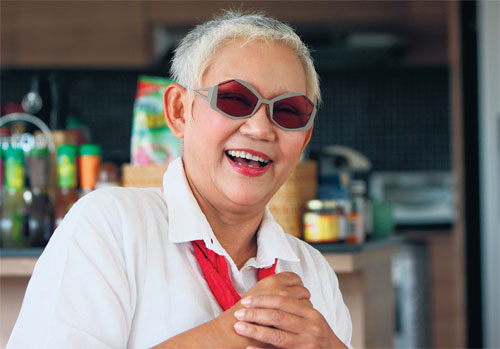 |
| Patravadi Mejudhon, founder and director of Patravadi Theatre. |
The water comes to Patravadi Theatre every year, like to everyone else in soi Wat Rakang. This year it arrived in much greater quantity and stayed there longer than usual, but long enough to force Patravadi Theatre to close its door for good.
The damage is too great to turn the place back into a functioning theatre once more. But its owner Patravadi Mejudhon is least sentimental about the loss.
"I'm not attached to anything. And we have one [a school as well as a theatre] in Hua Hin now. When I think of that place, it's more about the people who grew up there," she said over the phone. Then she listed a few of her students who have made a solid career in theatre and on the art scene.
The artist has placed the theatre, and her home opposite it, in the care of her eldest daughter and businesswoman, Waewadee Sritrairat, who has a project in mind but will not yet reveal the details.
The venue in soi Wat Rakang, in fact, had ceased to stage Patravadi Theatre's productions for approximately a year before it finally closed. The artist merely rented out the space to other theatre companies.
Her heart is in Hua Hin now, with the students and teachers at Patravadi High School, a boarding school that integrates arts into its curriculum and the students' daily life.
Vic Hua Hin, located in the same compound as the school, is the new home for her productions, as well as the Fringe Festival, which for years was a leading occasion for Bangkok theatre-lovers with a predilection for experimental work.
Founded in 1992, Patravadi Theatre not only boasted an elegant outdoor stage just a few steps from the Chao Phraya River, it also created large-scale theatre productions with an aesthetic reflective of its founder's famed stylishness. Moreover, Patravadi did something that was considered bold and novel at the time _ she brought the East and the West together.
This may sound like a superficial conceit nowadays, but Patravadi sometimes sent her entire production overseas to study dance. She invited artists from abroad and local veteran artists to train her performers in various forms of arts, and to collaborate on productions.
Patravadi was always on the lookout for young talents she could welcome on board. Patravadi Theatre was a fertile ground for experimentation. It also groomed its performers with strict discipline and demanded perfection. And what beautiful results it produced.
From the very beginning, Patravadi adapted and refashioned classic literature into stage spectacles that were appealing and digestible for the modern audience.
Shining examples include the poignant musical that featured superb dancing, Ngoa Pa, the rock opera Inao Joraka, and Sahassadecha, in which the rarely staged episode of the Ramayana unfolded in the form of khon and shadow puppetry.
There were also simple productions. The dark and difficult Kong Kao Noi retold the folk tale of the same name through butoh and video interviews of real-life mothers. Patravadi's solo performance, Rai Phratraipidok, which took its inspiration from the Tripitaka Buddhist scripture, proved what a daring artist she could be.
"For me the golden age of Patravadi Theatre was during our first two to three years. I went back to watch some of the videos of our old productions, and I was amazed at how we pulled it off back then. We didn't have as many people.
We didn't have a lot of financial support. We gained so many new sets of knowledge in that place. We really lived and worked to the fullest there," she recalled.
As Patravadi's interest in Buddhism deepened, her productions pared down and grew more spiritual, philosophical, an even didactic. "I've matured. My students have matured. So my work becomes simpler. The noisy spectacles are for the young ones. For us adults, they feel excessive," she said.
What grew instead in that venue were spaces for the younger generation of artists. The premises of Patravadi Theatre eventually came to house Studio 9, a restaurant by the river where diners could enjoy performances by young artists, a gallery, a library, a semi-outdoor stage Studio 1,
which was used for staging productions, rehearsal studios where inexpensive dance classes took place on weekends, and apartments for Patravadi Theatre's artists and guest artists.
In an open space at the entrance of the theatre, there were once youngsters and adults taking weekly Thai dance lessons from respected dance instructors, and even a national artist.
The fee never went over 100 baht. This spirit of teaching and learning has always been a major part of the theatre of Patravadi. These days, she couldn't be happier being a full-time teacher in her new home.
"When we were at soi Wat Rakang, I could see changes in my students' performances, but I didn't get to see how their thinking changed, nor what they were like as people in the society. Some of them were already grown-ups. In Hua Hin, we spend the whole day together.
The changes I see in the students are much greater, and they happen faster. When you're 12 or 13 years old, you have so much ahead of you."

No comments:
Post a Comment